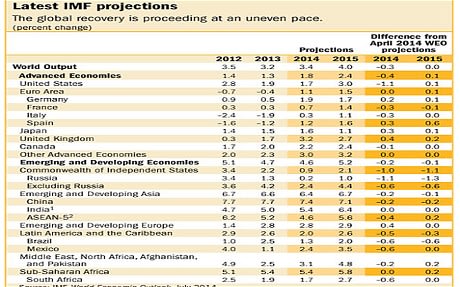IMF fears ultra-low rates are fuelling asset bubbles
(IMF、超低金利が資産バブルを煽っていると懸念)
By Ambrose Evans-Pritchard
Telegraph: 6:07AM BST 24 Jul 2014


(IMF、超低金利が資産バブルを煽っていると懸念)
By Ambrose Evans-Pritchard
Telegraph: 6:07AM BST 24 Jul 2014
Chief economist Olivier Blanchard says fund is watching financial markets "like a hawk" because world economy is still too fragile to withstand interest rate rises
チーフ・エコノミストのオリヴィエ・ブランチャード氏曰く、IMFは「タカのように」金融市場を見張っている、世界経済は相変わらず金利上昇に耐えられないほど脆弱だからだそうです。
Ultra-low interest rates around the world are fuelling financial bubbles and pushing investors into overvalued assets, the International Monetary Fund has warned in a marked shift of policy.
世界中の超低金利は金融バブルを助長し投資家に割高な資産を買わせている、とIMFが明らかに政策転換して警告しました。
"Financial markets have been very optimistic in recent months. Frankly, we're seeing some prices that are very high compared with what is happening the real economy," said Gian Maria Milesi-Ferretti, the fund's deputy director.
「金融市場はこの数か月間極めて楽観的である。率直にいって、一部の価格は実体経済と大きく乖離していると考える」とデピュティ・ディレクターを務めるジアン・マリア・ミレシ=フェレッティ氏は言いました。
"We don't think there is a generalised bubble but this is something we have to watch closely. In a world of very low interest rates there is an incentive to take on risk and hunt for yield, and that can lead to excesses," he said.
「一般的なバブルが起こっているとは思っていない。しかしこれは我々が監視しなければならないものである。超低金利世界においては、リスク・テイクと金利の追及に対してインセンティブが存在し、それは過剰につながる可能性がある」とのこと。
Olivier Blanchard, the IMF's chief economist, said the fund is now watching financial markets "like a hawk" but said the world economy is still too fragile to withstand the introduction of tighter monetary policy. "The first line of defence should be macro-prudential tools; slowing down the housing market for example. The recovery is not very strong and really needs to be nurtured," he said.
IMFのチーフ・エコノミスト、オリヴィエ・ブランチャード氏は、IMFは現在、「タカのように」金融市場を見張っているとしながらも、世界経済は相変わらず金融政策の引き締めには耐えられないほど脆弱だと述べました。
「防御の最前線はマクロプルーデンシャル・ツールでなければならない。例えば住宅市場を減速させるものだ。景気回復は余り堅調ではなく、真実手助けを必要としている」とか。
The IMF cut its global growth forecast for 2014 from 3.7pc to 3.4pc in the latest update to its World Economic Outlook, warning that the advanced economies are still being weighed on by high levels of debt.
IMFは最新の世界経済展望の中で、2014年の世界経済の成長見通しを3.7%から3.4%に下方修正し、先進国は引き続き大きな債務負担を負い続けていると警告しました。
"Global growth could be weaker for longer, monetary policy should thus remain accommodative in all major advanced economies," it said.
「世界経済の成長はより長期的に低迷する可能性があるため、金融政策は全ての主要先進国において引き続き緩和的でなければならない」とのことです。
It has become a ritual for the IMF to keep having to cut its forecasts, a sign of the malaise in the global economy as excess manufacturing capacity lingers and a record 25pc world saving rate drains aggregate demand.
IMFの下方修正は当たり前になってしまいました。
消えない余剰生産能力と史上最高の25%に達した世界の貯蓄率が総需要を失わせている世界経済における沈滞のサインです。
The shock contraction in the US economy during the first quarter accounts for part of the downgrade, but so does the dimming prospect for emerging economies that have picked the low-hanging fruit of catch-up growth and are struggling to find new development models. Several are now nursing their own hangovers from credit booms, while China's housing market is deflating.
米経済のQ1の衝撃的マイナス成長が下方修正の原因の4分の1を担っているのですが、キャッチアップ時代を終えても新たな発展モデルを見出すのに四苦八苦する新興市場の望みが薄れつつあることも原因となっています。
幾つかの新興国は今や信用バブルの二日酔いに苦しむ有様であり、中国の住宅バブルは弾けつつあります。
Emerging market growth was cut by 0.2 points to 4.6pc this year. This is a far cry from the glory days of the BRICS boom before the Lehman crisis, reflecting pervasive lack of reform. Latin America will grow by just 2pc, with Brazil slumping to 1.3pc and just 2pc in 2015. Russia has been slashed to 0.2pc as Western sanctions escalate and financial flows dry up.
新興市場の今年の成長見通しは0.2%下方修正されて4.6%とされました。
リーマン危機前のBRICSブームという栄光の日々からは程遠い水準であり、改革不足の蔓延を反映しています。
南米はたった2%とされており、ブラジルは1.3%まで落ち込んだ上に、2015年も僅か2%とされました。
西側の制裁が強化され資金の流入が枯渇していることを受けて、ロシアは0.2%まで大幅に引き下げられました。
Mr Blanchard warned that monetary tightening by the US Federal Reserve still poses a serious risk to many of these countries and could set off fresh market tremors. "I don't think we will see major financial chaos, but there will be bumps such as those we saw in May 2013. Countries must be ready for that," he said.
FRBの金融引き締めはこれらの国々の多くに対して引き続き深刻なリスクであり、新たな市場の混乱を引き起こす可能性がある、とブランチャード氏は警告しました。
「大規模な金融カオスにはならないと思うが、それでも2013年5月のような混乱にはなるだろう。どの国も覚悟しなければならない」そうです。
The fund said a shift in confidence could lead to "sudden and substantial changes in capital flows", and warned that "new risks" had emerged in the Middle East. Officials say that roughly $470bn (£276bn) has leaked into emerging markets as a direct result of the Fed's quantitative easing that would not have been invested otherwise. Much of this is "hot money" engaged in various forms of the carry trade. The danger is a sudden rush for the exits. This could occur sooner than widely assumed as the US jobless rate plummets to levels that start to ignite wage pressures.
IMFは、信頼のシフトは「資本の流れを突然大々的に変える」場合があるとして、中東で「新たなリスク」が発生したと警告しました。
当局者によれば、FRBの量的緩和の結果として、さもなければ流入しなかった約4,700億ドルもの資金が新興市場へ流れ込んだとのこと。
この大半は様々な形のキャリートレードに関わる「ホットマネー」です。
危険なのはその突然の大量流出です。
米失業率が賃金圧力を発生させ始める水準まで下落すれば、広く考えられているよりも早く実現する可能性があります。
Mr Blanchard disputed claims by the Bank for International Settlements that the global financial system itself is in increasing danger because of excess monetary stimulus and quantitative easing by Western central banks, insisting that leverage has been falling in banks and the shadow-banking nexus.
ブランチャード氏は、西側の中銀による過剰な金融刺激とQEの結果、国際金融システムそのものが増大する危機にあるとするBISの主張に異議を唱え、銀行とシャドー・バンキングの両方においてレバレッジは減っていると強く主張しました。
The IMF's warnings nevertheless narrow the chasm in thinking that has emerged between the world's two leading watchdogs. The fund largely failed to see the Lehman crisis coming in 2008, or at least gave muted warnings. The BIS was famously vindicated.
それでもIMFのワーニングは、世界の二大監視機関の意見の差を狭めています。
IMFは2008年にリーマン危機の接近を殆ど察知出来なかったか、少なくともまともなワーニングを出しませんでした。
BISの正しさが証明されたことは有名です。
The two institutions have been going through a replay of their policy clash as the current global cycle starts to age and the usual signs of speculative excess appear. The IMF may now be taking the first precautionary steps to cover itself in case there is a fresh upset, though it clearly still thinks the greater risk is a low-growth trap, with deflationary dangers in Europe.
現在の世界経済のサイクルが終わりかけて、いつもの過剰投機のサインが現れはじめている時に、この二大監視機関は再び政策を衝突させています。
IMFは、新たな危機が起こった場合に備えて最初の予防線を張りつつあるのかもしれませんが、低成長トラップとヨーロッパでのデフレ危機の方が遥かに大きなリスクであるという考えに変化がないのは明らかです。
The fund cut its forecast for Italy to 0.3pc and for France to 0.7pc, but raised the outlook for Germany to 1.9pc. The widening gap shows once again that the European Central Bank has a near impossible task trying to set a one-size-for-all policy for two key regions pulling in opposite directions.
また、イタリアとフランスの成長見通しをそれぞれ0.3%、0.7%まで下方修正しましたが、ドイツは1.9%へ引き上げました。
この広がり続ける格差は、ECBが逆方向に向かう二つの主要地域のためにフリーサイズ政策をまとめようとする、という殆ど不可能な仕事を抱えているのだ、ということを改めて見せつけています。





















